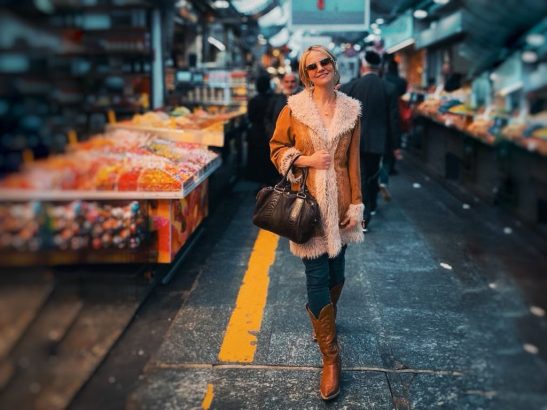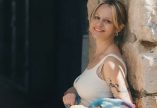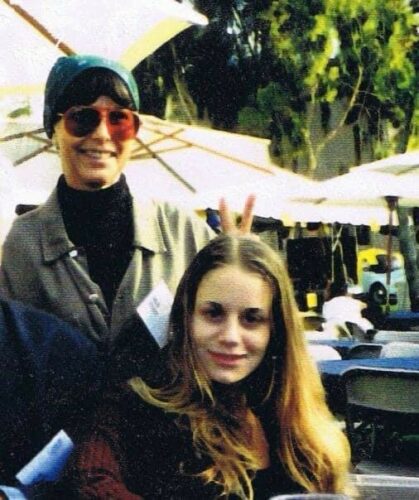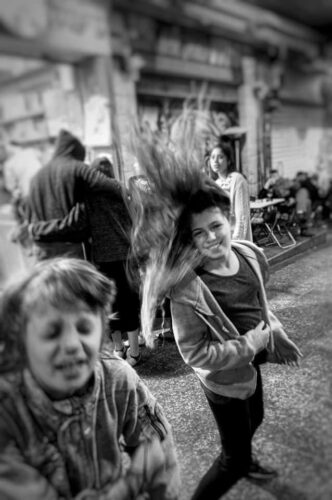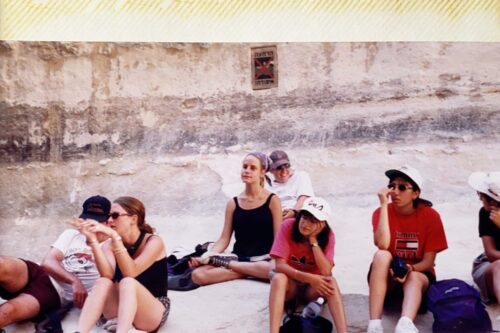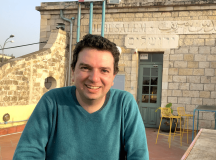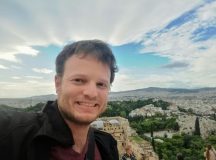Sarah Tuttle-Singer is the author of Jerusalem, Drawn and Quartered: One Woman’s Year in the Heart of the Christian, Muslim, Armenian, and Jewish Quarters of Old Jerusalem and a writer for The Times of Israel. In this three-part series, Sarah soundtracks her Israeli experience. Through a series of songs, Sarah takes us on her journey from her first visit as a teenager from Los Angeles to the present day, as a mother of three Israeli children in the aftermath of 7 October.
ETNIX – Desert Bird
I’ll never forget the song that was playing when my mother kicked me out of the car on Sepulveda Boulevard in Los Angeles during my last year of high school.
It was all the way from Israel, recorded on a mixtape made in Israel by a soldier I met on the beach at a bonfire.
Like a freebird
yearning to touch the skies
like a freebird
leading to the waterline
desert bird
I loved that song – the echo of the synthesiser, the throb of the baseline… the primal sound of the desert wind in the melody. It was THE perfect song for flying along the coast back from a night on a beach in Tel Aviv, with tar still stuck to the soles of my feet, the windows rolled all the way down while the thick summer night poured in.
God, I wanted to be there so hard – to feel my hair whipping across my face on a hot night chasing the dawn – free, before that last year of high school. I was the desert bird.
If you’ve ever lived through that last year of high school, at that breaking point of breaking away, then you’ll understand what I mean when I say that my mother could do nothing right.
Nothing. From tapping her fingers in time with the music, to trying to sing along to words she didn’t know, to trying to understand her wild, wilful girl who wore shirts that were way too tight, and eyeliner that was way too dark, who was madly in love with a country ten time zones away.
Nothing.
‘Mom, you don’t know Hebrew, so stop trying to sing along.’ I told her.
She stopped singing, stared at me in a way that shrunk me in half, jerked the steering wheel to the right, and screeched across three lanes of traffic on Sepulveda Boulevard.
She leaned over me and shoved the passenger door open.
‘Get out,’ she growled in a voice like tinted glass.
I got out, and walked the rest of the way home.
The next time we rode together, she played Bach. Or maybe Beethoven. Like nothing had happened.
And now, light years away from that moment –– my mother dead, and I, on the other side of the world having flown away to Israel, and now a mother myself –– I listen to this song again for the first time in years. The memory of that night with the windows rolled down is still in my hair.
I sing along.
‘Mama, you shouldn’t try to sing in Hebrew,’ my daughter says.
And for those few moments, I remember how it felt that summer with the night wrapped around me, how it felt to feel at home so far from home.
And how I would give ten years of my life just to be back in that car with my mother listening together, just so I could tell her that I didn’t understand the words then, either.
Sarah Tuttle-Singer and her mother
DUDU AHARON – Terminal 3
It’s wild growing kids in Israel who speak Hebrew –– who can pronounce ‘Resh’ and ‘Ayin,’ and roll their eyes while I ‘break my teeth’ (as the Israeli saying goes) over words that flow so easily for them.
They’re Israeli without having to parse what that means. It’s just as much a part of their identity as their eye colour and their double–jointed thumbs and their love of music.
‘What Israeli songs do you love?’ I ask them.
‘What do you mean, ISRAELI songs?’
‘Like songs in Hebrew by Israeli singers,’ I answer.
‘Oh, you mean just SONGS.’
Songs. No qualifier. Just songs. I love that there’s no qualifier for my Israeli children.
‘Ok, fine. Songs,’ I reply.
My son shrugs. ‘I guess something by Efoh HaYeled. They’re cool.’
‘Already on the docket,’ I say.
‘You’ve heard of them?’ he quips.
‘Honey, they were around before you were even born,’ I say. ‘I used to listen to them when I was your age.’
‘Oh, I didn’t know they had electric guitars in the time of the Bar Kokhba revolt,’ my son smirks.
‘You should include Terminal Shalosh,’ my daughter says.
‘Why?’ I ask.
‘Well, because it’s a fun song. It’s got some “Muzika Mizrahit” influence but it’s also mainstream and just fun, you know? And I also remember this one crazy night in the shuk a few years ago it was playing and we danced!’
She’s right. It’s a fun song. And in some ways, it’s a very ISRAELI song that captures a young and restless spirit –– one very much alive in me at times even though I’m almost 43.
Set in ‘Terminal Shalosh / Terminal 3’ – the international terminal at Ben Gurion airport, the song is rife with possibility and optimism and romance and longing.
And it’s a song that breaks down walls. I remember being in Jordan with a group of Israeli and Palestinian and MENA peace activists shortly after it came out — we were all being so careful with each other, so polite… when finally someone suggested we share music from our respective cultures, and someone else played this song. By the end of it, everyone –– Jewish, Christian, Muslim –– was dancing along with it.
Let’s take a boat and swimsuit
we will sail beyond the horizon…
It’s funny – Israeli culture is steeped in love of land and home… like the protest anthem song ‘Ein Li Eretz Aheret’ exemplifies. But part of the Israeli Zeitgeist is also a thirst for adventure.
Yes, we are rooted in a rich history with a strong sense of identity, and we cherish home with a fierce devotion, but alongside this lies a certain kind of wanderlust that is ALSO deeply ingrained in the Israeli psyche and this song brings it all home.
The words and tempo are light and insouciant — no deep, profound, poetic meaning in this song… no existential questions asked and answered. No talk of war or heartbreak or the meaning of life. And THANK GD. Just like Israelis need to get out of Israel to ‘clear their head’ – especially after the army — this song is exactly what we need sometimes — a great beat, a little exploration, the promise of an adventure, and embracing the simple fact that just BEING can be fun.
Sarah’s children in the shuk, dancing to ‘Terminal 3’
EFOH HAYELED – Ma she’over alai
The first time I fell in love with Israel was the summer of 1997 on a teen trip with Young Judea. The history! The beaches! The food! The spirituality! The hot Israeli soldiers! The music! But the first time I fell in love with an Israeli was a year later on the bus in the middle of the Negev desert on a similar trip.
He was our madrich – the counsellor, and he was soooo cool, with his sharwalim with the elephant print that he said he picked up in India, the sandals from Nepal, and the hemp necklace with the puka shell he bought at the gas station just outside of Rishon.
It wasn’t love at first sight though – he was handsome, but I didn’t see him ‘that way’ until three weeks into the Trip when we were on the tour bus and he said ‘ok, ok ok listen up… emmmmm… you’ve heard enough Hava Nagila and Yerushalayim Shel Zahav to make your parents happy. Time to hear what actual Israelis listen to.’ And with that, he pressed play on the tape deck , and the whole bus vibrated with the powerful low notes of an electric guitar. I was in awe. The rest of the song did not disappoint: a grunge melody both playful and angsty,— so similar to the music I’d listen to in LA during the early / mid 1990s when I was discovering my own taste in music separate form my parents choices … except THIS was in Hebrew and therefore infinitely more seductive and way more exciting.
To be clear, I didn’t have a clue what the song was about when I first heard it (I know NOW it’s a song about complicated feelings and a messy breakup — angsty, as I said ) but that was completely NOT. THE. POINT when I was sixteen and on the bus somewhere in the middle of the Negev desert gazing at our suddenly totally sexy counsellor who had just turned us on to Israeli grunge music.
This was NOT what our parents had in mind when they pictured us singing folk songs on the tour bus and THAT was exactly what made my pupils dilate and my heart skip a dozen beat. A whole new Israel opened before us – an Israel of Israeli teenagers our age, people we could relate to. People who could be our friends. People we could fall in love with. And THIS was the beginning of a deep, abiding love for me.
It wasn’t just my counsellor I fell in love with, but with Israeli music, and my world blew wide open.
Sarah visiting Israel in 1997
TIPEX – Hachayim Shelcha B’Laffa (whole album – but especially the song about the old bus station)
The last place I wanted to be at the end of august 1998 was at Ben Gurion airport, getting ready to fly back to LA. I even thought about running away and living in a tent in the Negev, or finding an abandoned sukkah on a roof in Jerusalem, or building a shack out of palm fronds along the Mediterranean.
Instead, I promised myself one day I’d be back. And I told the woman at passport control that one day I would make Aliyah and become Israeli.
‘Emmmmm go back to New Jersey,’ she said.
‘Uh I’m from Los Angeles!’ I answered.
‘Emmmm that’s even worse,’ she said.
I was morose.
The other kids on my summer programme had skipped off to buy Ahava Dead Sea face masks at duty free, and I was alone, wearing the IDF t-shirt I had picked up on Ben Yehuda Street, and dragging my feet through the terminal.
‘Hey, why are you sad?’ A guy with a backpack almost as big as he was asked me.
‘I don’t want to leave Israel,’ I answered.
‘Funny,’ he said. ‘I just finished the army and I can’t wait to leave and clear my head a little.’
‘Where are you going?’
‘India,’ he said with a far away look. ‘A little cliche, but that’s ok. All of us do it after our service. We need a break.’
‘How can you ever need a break from here?’ I asked, baffled.
‘Motek, you aren’t from here — you just saw it through a visitor’s eyes. This place is amazing, it’s Home … but it’s also heavy, and I just spent three years carrying a gun and wearing a uniform and listening to Bibi and I’m tired.’
‘You’ll come back?’ I asked.
‘Of course. Nowhere else I want to live.’
‘That’s how I feel.’
He smiled.
‘Look, I’m going to buy some music to listen to when I’m homesick on my trip – because even though I need a break, I know I’m going to get homesick — maybe music will also help you feel connected.’
I already had a mix tape in my bag of the songs from the bus – including Efoh HaYeled – and I loved the idea of buying my own Israeli music and discovering what I liked for myself.
I followed him to the store. ‘My friends and I did a road trip all over Israel before the army, and listened to this band,’ he told me. ‘Tipex (Tea Packs). You might like them.’
He handed he an album with a hamsa on the cover. ‘Hachayim shelcha b’Laffa’ – I ran my fingers over the words and sounded them out. I could decode Hebrew but didn’t always know what it meant. ‘What does it mean?’
‘Your life in Lafa — Lafa is kinda like Pita.’
‘Yeah, but What does it MEAN?’
He shrugged. ‘It’s kind of… what’s the word… absurd. Like it doesn’t have a meaning. Try the album. It’s good.’
So I did. And to this day, I still love it. A fusion of jazz and pop and ‘eastern’ music, and funk and even a little rap and acoustic guitar… as I learned Hebrew, I discovered some of the songs are, as the guy at the airport said, totally absurd – but on purpose: to reflect the ridiculousness and incongruities of life. Another song – my favourite – ‘the old bus station’ evokes a poignant nostalgia for the old Israel. There are sweet and silly love songs, and political commentaries. Basically, an album that encapsulates some of the many facets of Israel in the 1990s.
As I struggled to learn Hebrew, I used the lyrics booklet as a guide, and it was poetry to me – light and dark, confetti and real meaning… and it only made me yearn for Israel more.
I never saw the guy at the airport again – I can only assume he came home as he said he would.
I have no doubt he did though, because as challenging as this place can be at times, it is still full of magic and possibility, and almost every Israeli I know who leaves for a while, comes back again.
And years later, just before the old cd shops began to close forever, I saw an American girl like me – down to the same Idf t–shirt – looking through a row of cds.
‘Try this one,’ I said, and handed her Hachayim shelcha b’Laffa. ‘It changed my life.’

